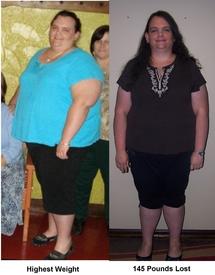Cooked or Raw ounces

ronde
Posts: 29 Member
What weight is the most accurate when counting any type of meat calories. Before its cooked or after?
0
Replies
-
hmmm ..I always weighed it after I cooked it and people told me I should also BUT as I was looking for references before I told you what to do I found this website :: http://jcdfitness.com/2011/09/counting-calories-a-no-bs-guide/ and this says to weigh it before. So guess I Have been doing it wrong.. But I still have been losing weight (weighing the meat/poultry/fish after I cook it) Lost 18 lbs so far. ... Sorry guess I really dont know and am just as confused
 .. ( and will be following this post as well!) 0
.. ( and will be following this post as well!) 0 -
I always do mine after.0
-
I would weigh after! Only makes sense to me: some of the blood, depending on how 'done' the meat is, will cook away. Fat, if present, fries away as well, for the most part.
This just makes more sense than weighing before. >.>0 -
Most accurate: raw Edit: Thought I'd add most nutritional info's say a serving is "4 oz raw"
Most convenient: cooked
I personally weigh mine after as I cook from frozen, not raw. I doubt the calories are so substantially different that it really matters though. Unless you eat A LOT of meat a day.0 -
Before. If you have 4 oz of chicken before cooking it, and it is 3 oz after it is still the same amount of calories. It loses water when cooking, but the calories remain the same. I always used to weigh it cooked and couldn't figure out why I was not losing weight, and I think that had something to do with it. Especially with pork loin! It is half the weight when broiled and I was only counting half the calories I should have been!0
-
They're all but the same. When you're done cooking most of what gets cooked out is water, with a small portion being fat....... assuming we're talking something like boneless skinless chicken breast.
With that being said I've only ever seen anything being weighed before cooking. I've never seen or read or heard of anyone weighing things post cooking.0 -
I've always thought before. If im making hamburger patties I make the patties 4 oz a pc. That;s 16 oz, 1 lb of ground meat. I weigh it before so i can see what size patty i need instead of cooking all different sizes then cutting pieces off to make 4 oz0
-
I also know that state guidelines for schools tell them to weigh meat raw, so if they are required to offer a certain amount of oz for meat at school, that is the raw oz, not the cooked. And the calories would stay the same as well.0
-
Depends on the circumstances. If I'm at a restaurant and estimating how much is on my plate, I'll use the "cooked" weight listing. If I'm entering it into a recipe, or cooking it myself, I'll usually weigh it before I start and use the "raw" entry. But say I'm cooking with 80/20 hamburger, and I drain off all the grease, I know that will change the nutrition info a bit so I'd use the "cooked, browned, drained" entry there.
(This is the reason there are so many entries in this database!)0 -
It depends on what entry you use. If you use "beef - raw" then you need to weigh it raw. If you use "beef - broiled" then you need to weigh it after your broil it. Below is a site I use a lot and I've noticed that some of them are in the MFP database. It's usually the ones that don't have an * by them (i.e. not added by users).
http://nutritiondata.self.com/0 -
Depends on the circumstances. If I'm at a restaurant and estimating how much is on my plate, I'll use the "cooked" weight listing. If I'm entering it into a recipe, or cooking it myself, I'll usually weigh it before I start and use the "raw" entry. But say I'm cooking with 80/20 hamburger, and I drain off all the grease, I know that will change the nutrition info a bit so I'd use the "cooked, browned, drained" entry there.
(This is the reason there are so many entries in this database!)
Thank you! This was kind of my reasoning...making recipes. I guess I will just have to make little adjustments depending on the meat. 1oz plus or minus will affect my daily calorie and I'm trying to be accurate as possible and consistant. Thanks everyone for you input.0 -
Similarly, are the weights for things like oranges and grapefruits or bananas before peeling or after? (Much tidier to weigh before <g>, and when I have them at work I don't have a scale there anyway.) Or when you weigh one apple, do you subtract something for the core when you log it? Probably doesn't make a lot of difference caloriewise but it also affects fiber, etc. I can do it either way, but I don't know what assumptions get used when the info goes into the database.0
This discussion has been closed.
Categories
- All Categories
- 1.4M Health, Wellness and Goals
- 398.1K Introduce Yourself
- 44.7K Getting Started
- 261K Health and Weight Loss
- 176.4K Food and Nutrition
- 47.7K Recipes
- 233K Fitness and Exercise
- 462 Sleep, Mindfulness and Overall Wellness
- 6.5K Goal: Maintaining Weight
- 8.7K Goal: Gaining Weight and Body Building
- 153.5K Motivation and Support
- 8.4K Challenges
- 1.4K Debate Club
- 96.5K Chit-Chat
- 2.6K Fun and Games
- 4.8K MyFitnessPal Information
- 12 News and Announcements
- 21 MyFitnessPal Academy
- 1.5K Feature Suggestions and Ideas
- 3.2K MyFitnessPal Tech Support Questions








